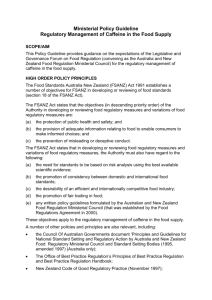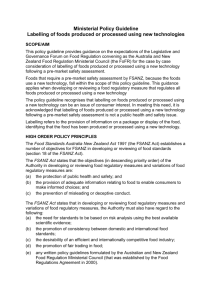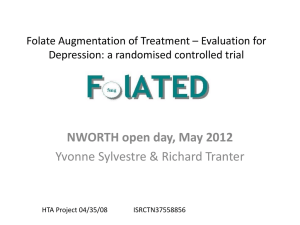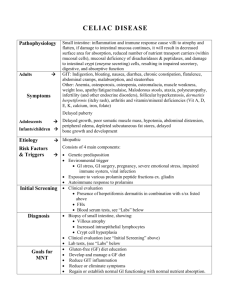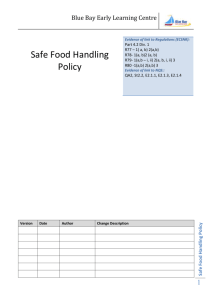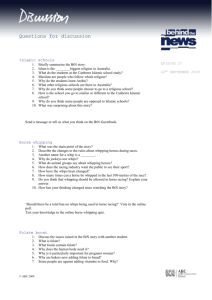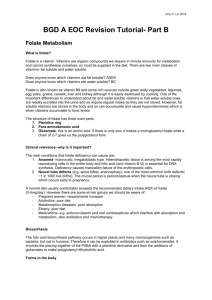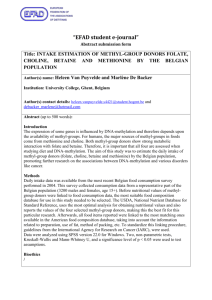word - Food Standards Australia New Zealand
advertisement
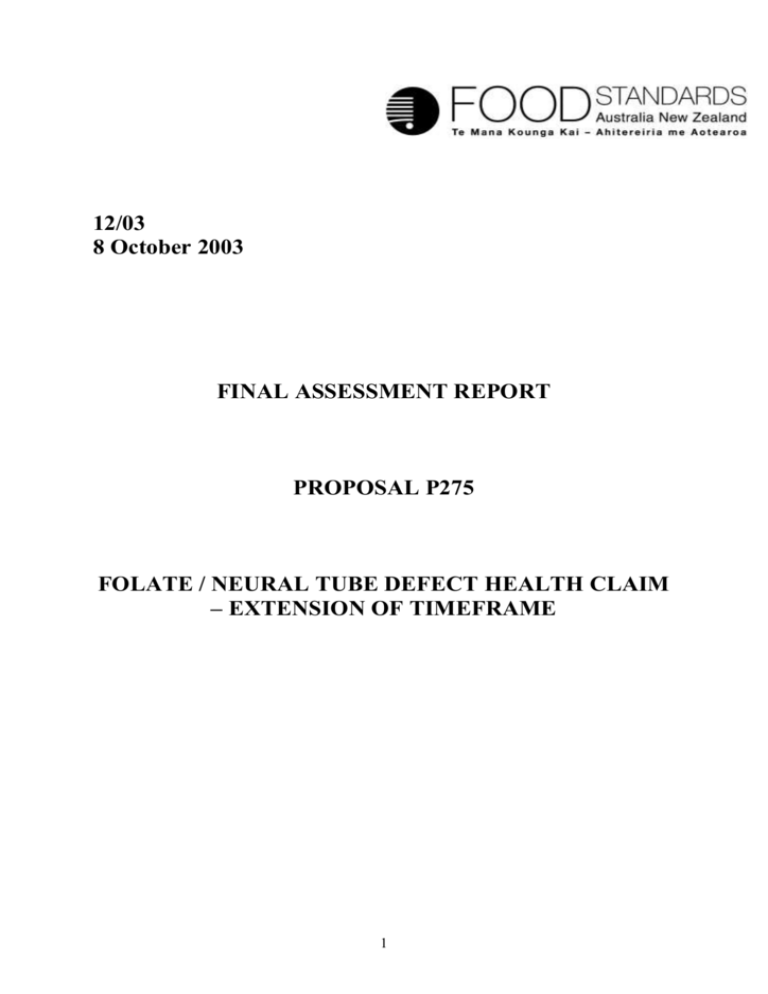
12/03 8 October 2003 FINAL ASSESSMENT REPORT PROPOSAL P275 FOLATE / NEURAL TUBE DEFECT HEALTH CLAIM – EXTENSION OF TIMEFRAME 1 FOOD STANDARDS AUSTRALIA NEW ZEALAND (FSANZ) FSANZ’s role is to protect the health and safety of people in Australia and New Zealand through the maintenance of a safe food supply. FSANZ is a partnership between ten Governments: the Commonwealth; Australian States and Territories; and New Zealand. It is a statutory authority under Commonwealth law and is an independent, expert body. FSANZ is responsible for developing, varying and reviewing standards and for developing codes of conduct with industry for food available in Australia and New Zealand covering labelling, composition and contaminants. In Australia, FSANZ also develops food standards for food safety, maximum residue limits, primary production and processing and a range of other functions including the coordination of national food surveillance and recall systems, conducting research and assessing policies about imported food. The FSANZ Board approves new standards or variations to food standards in accordance with policy guidelines set by the Australia and New Zealand Food Regulation Ministerial Council (Ministerial Council) made up of Commonwealth, State and Territory and New Zealand Health Ministers as lead Ministers, with representation from other portfolios. Approved standards are then notified to the Ministerial Council. The Ministerial Council may then request that FSANZ review a proposed or existing standard. If the Ministerial Council does not request that FSANZ review the draft standard, or amends a draft standard, the standard is adopted by reference under the food laws of the Commonwealth, States, Territories and New Zealand. The Ministerial Council can, independently of a notification from FSANZ, request that FSANZ review a standard. The process for amending the Australia New Zealand Food Standards Code is prescribed in the Food Standards Australia New Zealand Act 1991 (FSANZ Act). The diagram below represents the different stages in the process including when periods of public consultation occur. This process varies for matters that are urgent or minor in significance or complexity. Comment on scope, possible options and direction of regulatory framework Provide information and answer questions raised in Initial Assessment report Identify other groups or individuals who might be affected and how – whether financially or in some other way INITIAL ASSESSMENT Public Consultation DRAFT ASSESSMENT Comment on scientific risk assessment; proposed regulatory decision and justification and wording of draft standard Comment on costs and benefits and assessment of regulatory impacts Public Consultation FINAL ASSESSMENT Those who have provided submissions are notified of the Board’s decision Public Information MINISTERIAL COUNCIL 2 An IA report is prepared with an outline of issues and possible options; affected parties are identified and questions for stakeholders are included Applications accepted by FSANZ Board IA Report released for public comment Public submissions collated and analysed A Draft Assessment (DA) report is prepared using information provided by the applicant, stakeholders and other sources A scientific risk assessment is prepared as well as other scientific studies completed using the best scientific evidence available Risk analysis is completed and a risk management plan is developed together with a communication plan Impact analysis is used to identify costs and benefits to all affected groups An appropriate regulatory response is identified and if necessary a draft food standard is prepared A WTO notification is prepared if necessary DA Report considered by FSANZ Board DA Report released for public comment Comments received on DA report are analysed and amendments made to the report and the draft regulations as required The FSANZ Board approves or rejects the Final Assessment report The Ministerial Council is notified within 14 days of the decision If the Ministerial Council does not ask FSANZ to review a draft standard, it is gazetted and automatically becomes law in Australia and New Zealand The Ministerial Council can ask FSANZ to review the draft standard up to two times After a second review, the Ministerial Council can revoke the draft standard. If it amends or decides not to amend the draft standard, gazettal of the standard proceeds Final Assessment Stage (s.36) FSANZ has now completed the assessment of the Proposal and held a single round of public consultation under section 36 of the FSANZ Act. This Final Assessment Report and its recommendations have been approved by the FSANZ Board and notified to the Ministerial Council. If the Ministerial Council does not request FSANZ to review the draft amendments to the Code, an amendment to the Code is published in the Commonwealth Gazette and the New Zealand Gazette and adopted by reference and without amendment under Australian State and Territory food law. In New Zealand, the New Zealand Minister of Health gazettes the food standard under the New Zealand Food Act. Following gazettal, the standard takes effect 28 days later. Further Information Further information on this Proposal and the assessment process should be addressed to the FSANZ Standards Liaison Officer at one of the following addresses: Food Standards Australia New Zealand PO Box 7186 Canberra BC ACT 2610 AUSTRALIA Tel (02) 6271 2222 www.foodstandards.gov.au Food Standards Australia New Zealand PO Box 10559 The Terrace WELLINGTON 6036 NEW ZEALAND Tel (04) 473 9942 www.foodstandards.govt.nz Assessment reports are available for viewing and downloading from the FSANZ website www.foodstandards.gov.au or alternatively paper copies of reports can be requested from FSANZ’s Information Officer at info@foodstandards.gov.au including other general enquiries and requests for information. 3 CONTENTS EXECUTIVE SUMMARY AND STATEMENT OF REASONS ....................................... 5 1. INTRODUCTION............................................................................................................ 6 1.1 2. NATURE OF PROPOSAL .............................................................................................. 6 REGULATORY PROBLEM .......................................................................................... 6 2.1 CURRENT REGULATIONS ........................................................................................... 6 3. OBJECTIVE .................................................................................................................... 6 4. BACKGROUND .............................................................................................................. 7 4.1 5. HISTORICAL BACKGROUND ....................................................................................... 7 RELEVANT ISSUES ...................................................................................................... 8 5.1 5.2 SUBMITTERS’ VIEWS ................................................................................................. 8 FSANZ ASSESSMENT ................................................................................................ 8 6. REGULATORY OPTIONS ............................................................................................ 9 7. IMPACT ANALYSIS ...................................................................................................... 9 7.1 AFFECTED PARTIES ................................................................................................... 9 7.2 DATA COLLECTION .................................................................................................. 10 7.3 IMPACT ANALYSIS ................................................................................................... 10 7.3.1 Option 1 – do nothing ...................................................................................... 10 7.3.2 Option 2 – extend expiry date .......................................................................... 11 8. CONSULTATION ......................................................................................................... 11 8.1 9. WORLD TRADE ORGANIZATION (WTO) ................................................................. 11 CONCLUSION AND RECOMMENDATION ........................................................... 12 ATTACHMENTS .................................................................................................................. 12 DRAFT VARIATIONS TO THE AUSTRALIA NEW ZEALAND FOOD STANDARDS CODE ............. 13 SUMMARY OF SUBMISSIONS ................................................................................................ 14 . 4 Executive Summary and Statement of Reasons Regulatory Problem The temporary provision allowing a folate/neural tube defect (NTD) health claim on approved products is due to expire on 13 February 2004. The Ministerial Council is currently developing policy guidance on health, nutrition and related claims. An extension to the temporary permission is sought until 13 February 2006 to ensure that the folate health claim does not expire in the interim. Objective To avoid disruption to current practice regarding use of the folate health claim until such time as policy guidance on health, nutrition and related claims is finalised. Options Option 1. Do nothing, with the effect that the folate/NTD health claim would no longer be permitted to be made after 13 February 2004. Option 2. Amend the temporary permission to extend the folate/NTD health claim until 13 February 2006. Consultation FSANZ is satisfied that this matter raises issues of minor significance or complexity only and, pursuant to section 36 of the FSANZ Act, conducted one round of public consultation on this Proposal, from 21 May to 2 July 2003. A total of twelve submissions were received. Nine submissions supported the Proposal to extend the temporary permission allowing the folate health claim, one submission presented a third option to continue the permission for the folate health claim on a permanent basis and two submissions opposed the Proposal. Conclusion and Statement of Reasons The preferred approach is to continue the temporary provision permitting the folate/NTD health claim until 13 February 2006. This approach is preferred in order to: avoid consumer confusion that would arise if the folate/NTD health claim could no longer be made, in the absence of a new health claims standard; minimise disruption to products on the marketplace currently approved to carry the folate/NTD health claim; and avoid the cost to governments of avoidable enforcement measures and public education. 5 1. Introduction 1.1 Nature of Proposal FSANZ is satisfied that this Proposal raises issues of minor significance or complexity only. FSANZ therefore decided to have one round of public consultation only following Draft Assessment, as provided for by section 36 of the FSANZ Act. After one round of public consultation, FSANZ prepared this Final Assessment. 2. Regulatory Problem 2.1 Current Regulations The temporary provision in Standard 1.1A.2, subclauses 3 (e), (f), (g), (h) and (i) of the Australia New Zealand Food Standards Code (the Code), allowing a folate/NTD health claim under certain conditions on listed food products, will, due to subclause 1C, cease to have effect on 13 February 2004. This temporary provision was originally expected to be in place only until the review of health and related claims under Proposal P153 was finalised and the subsequent commencement of a new health claims standard. The (then) Australia New Zealand Food Authority (ANZFA) finalised its advice to Ministers of the (then) Australia New Zealand Food Standards Council (ANZFSC) with regard to Proposal P153 in mid-2001. On 31 July 2001, Ministers decided to refer the matter of health claims to the Food Regulation Standing Committee (FRSC) to coordinate the development of policy advice on health, nutrition and related claims. That work is currently being progressed. If permission to make the folate/NTD health claim expires in the interim, food manufacturers using the voluntary temporary provision face potential disruption that might result in consumer confusion. 3. Objective In developing or varying a food standard, FSANZ is required by its legislation to meet three primary objectives which are set out in section 10 of the FSANZ Act. These are: the protection of public health and safety; the provision of adequate information relating to food to enable consumers to make informed choices; and the prevention of misleading or deceptive conduct. In developing and varying standards, FSANZ must also have regard to: the need for standards to be based on risk analysis using the best available scientific evidence; the promotion of consistency between domestic and international food standards; the desirability of an efficient and internationally competitive food industry; the promotion of fair trading in food; and any written policy guidelines formulated by the Ministerial Council. 6 The specific objectives for this Proposal are to minimise: 1. avoidable disruption to industry; 2. avoidable cost to Governments; and 3. potential consumer confusion that might result if permission to make the folate/NTD health claim was removed in the absence of a final outcome of the policy review of health, nutrition and related claims. 4. Background 4.1 Historical Background As a result of a Ministerial direction in 1998, ANZFA developed a Proposal (Proposal P170) to consider a folate/NTD health claim pilot as a matter of urgency and to truncate its usual assessment processes. The main aim of the pilot was to inform the review of health claims being conducted under Proposal P153 at that time. Following recommendations to ANZFSC, the variation to the Code to facilitate the pilot was gazetted. The variation permits voluntary use of the folate/NTD health claim under certain conditions on listed food items as a temporary exemption to the general prohibition on health claims. The original timeframe for the pilot was from November 1998 – November 1999, with the majority of pilot education and monitoring activities undertaken from November 1998 – May 1999. When ANZFA was unable to complete Proposal P153 by the end of 1999 as originally anticipated, ANZFSC agreed in late 1999 to extend the temporary permission for the folate/NTD claim until February 2001. The complexity of Proposal P153 caused further delays, and in July 2000, ANZFSC agreed to again extend the expiry date for the folate/NTD health claim, this time by 18 months to August 2002. It was anticipated that Proposal P153 would be completed, and a decision made by Ministers within that time. ANZFA finalised its advice on Proposal P153 to ANZFSC in June 2001. ANZFSC met on 31 July 2001 to consider the issue. ANZFSC decided to refer the matter of health claims to FRSC to coordinate the development of policy advice, which was also to take account of the review of nutrition content and related claims being undertaken by ANZFA at that time. At a subsequent meeting of the Ministerial Council on 24 May 2002, Ministers agreed to overarching policy principles for health and related claims developed by FRSC. Ministers asked FRSC for further advice on implementing a risk management approach that will protect public health and safety through scientific substantiation of high risk health claims, generic health claims for ease of use where evidence is clear and minimal regulation where there are no risks to public health. Included in this will be investigation into the creation of a ‘watchdog’ to monitor the use of health and related claims. Ministers asked that this advice be presented as a draft policy guideline and, at this time, FRSC is aiming to have the advice ready for a meeting of Ministers in November 2003. In May 2002, the Ministerial Council also agreed to the extension of the temporary provision allowing the folate/NTD health claim until 14 February 2004 or until commencement of a new health claims standard, whichever occurs sooner. 7 5. Relevant Issues 5.1 Submitters’ Views FSANZ conducted one round of public consultation on this Proposal, from 21 May to 2 July 2003. A total of twelve submissions were received. Nine submissions supported the proposal to extend the temporary permission allowing the folate health claim. While most submitters supporting the Proposal to extend the temporary permission did so without concern, Unilever noted the time that has lapsed since the introduction of the folate health claim as a pilot to test the effectiveness of health claims, and commented that they would like to see a health claims standard in place prior to the proposed end date of the temporary permission in February 2006. One submission did not support or oppose the Proposal and suggested an alternative to the two options set out in the Initial/Draft Assessment. George Weston Foods supported use of the folate/NTD health claim on approved products on a permanent basis and believed it would be more effective if the permission to use the folate health claim did not specify an end date. Two submissions opposed the proposal. Professor John Birkbeck is supportive of the establishment of a regulatory system for examining and approving health claims and believes that allowing extension of the folate health claim until February 2006 will further delay the introduction of a general standard for health claims. The Australian Consumers’ Association (ACA) stated that the proposal to extend the temporary permission to allow the folate health claim pre-empts a Ministerial decision that the outcome of the review of health, nutrition and related claims would allow the folate health claim. The ACA contend that it would be inappropriate to continue permissions to use the folate health claim, particularly while a general prohibition on health claims is specified by the Code. The ACA further noted that evaluation of the effectiveness of the folate health claim pilot did not necessarily support its extension. 5.2 FSANZ Assessment The temporary permission to use the folate health claim was initially implemented to assess the effectiveness of health claims and provide information to assist the review of health claims. In September 2000, ANZFA commissioned both a process evaluation of the management framework and an outcome evaluation for the folate health claim. The results of the evaluation were considered by ANZFA and subsequently presented to the Ministerial Council. Ministers have agreed to extend the folate health claim pilot since considering the outcome of the evaluation. The results of the evaluation of the folate health claim pilot require no further consideration at present and are therefore beyond the scope of this Proposal. The Proposal to further extend the temporary permission allowing the folate health claim does not present an impediment to the development of policy guidance for health, nutrition and related claims. The folate health claim was first implemented in November 1998, prior to the introduction of the current food regulatory system which separates the development of the overarching policy framework for food regulatory issues from the standard setting responsibilities of FSANZ. 8 As the introduction of the folate health claim was prior to a Ministerial decision to refer the coordination of policy advice in relation to health claims to FRSC, its introduction cannot be regarded as pre-empting an outcome from FRSC’s consideration of this matter. In addition, continuation of the folate health claim is consistent with the proposed policy principles for health, nutrition and related claims that were endorsed by the Ministerial Council on 24 May 2002, which support the use of scientifically valid claims. In the absence of any indication that these principles will change, FSANZ recommends continuing the current provisions in relation to the temporary folate claim. Nonetheless, the folate health claim was only approved by the Ministerial Council on a temporary basis. Allowing the folate health claim to be used on a permanent basis is not feasible at the present time, as this would involve prejudging the outcome in relation to the Ministerial Council policy guidance that is under development. Until this policy guidance is notified to FSANZ, FSANZ is not in a position to make such a substantive and permanent change to the current health claims standard. At this stage, FSANZ’s recommendation is to extend the expiry date for the permission allowing the folate health claim, as this results in no change to the existing permissions regarding use of the folate health claim, while ensuring that the arrangement continues to be temporary. Option 2 is the preferred option and is considered necessary to minimise disruption to industry, to minimise consumer confusion and to avoid additional enforcement costs. If the final outcome of the review of health, nutrition and related claims results in removal of permission to make folate/NTD health claims, industry currently making the claim will only need to change their labels and marketing practices once. 6. Regulatory Options There are two options for this Proposal: Option 1. Do nothing, thus permission to make the folate/NTD health claim would cease on 13 February 2004. Option 2. Amend Standard 1.1A.2, subclause 1C of the Code, to remove the expiry date of 13 February 2004 in respect of subclauses 3 (e), (f), (g), (h) and (i) which allow for the temporary provision, and insert a new expiry date so that these subclauses cease to have effect on 13 February 2006. 7. Impact Analysis 7.1 Affected Parties Those parties with potential to be affected by this Proposal include: those sectors of the food industry with products listed in the table to subclause 3(e) of Standard 1.1A.2 of the Code, making or preparing to make folate/NTD health claims at this time; those sectors of the food industry intending to make folate/NTD health claims who are not yet listed in the table to subclause 3(e) of Standard 1.1A.2 of the Code; 9 consumers accustomed to a range of products carrying folate/NTD health claims; and government enforcement agencies charged with the responsibility of policing compliance with the Code and educating consumers about food regulatory provisions. 7.2 Data Collection No submitter has provided data to assist with the assessment of the impact of P275 and FSANZ is not aware of other information of this sort currently available to determine the impact of a further extension. In Australia and New Zealand, fortification of foods with folic acid1 is voluntary and there is no ongoing monitoring or surveillance of the extent of folic acid fortification of foods in either country. The temporary provision allowing folate/NTD health claims is also voluntary, and there is no mechanism in place to know which of the foods listed in the table to subclause 3(e) of Standard 1.1A.2 of the Code are making folate/NTD health claims at any point in time. It is therefore not possible to obtain a measured cost of the impact of this Proposal. 7.3 Impact Analysis Precise quantification of the impact of this Proposal is not possible. 7.3.1 Option 1 – do nothing 7.3.1.1 Advantages None identified. 7.3.1.2 Disadvantages Food industry currently utilising the provision would be forced to revise their product labels and marketing arrangements. If the folate/NTD health claim was later reinstated, another set of changes would need to be made to labels. If the folate/NTD health claim was removed without explanation from products that have been carrying the claim, consumers familiar with the labelling and marketing of those products may become confused. Governments would need to educate consumers about the outcome, reinforcing the message that public health advice about increasing folate intakes to reduce the risk of having a child with a neural tube defect is unchanged. Governments would have to inform consumers that the change was an amended regulatory measure, not a change to the widely accepted public health advice. Government enforcement agencies would need to monitor removal of prohibited folate/NTD health claims from food products after 13 February 2004, taking action where necessary. 1 Folic acid is the form of the B vitamin, folate, used in the fortification of foods. The folic acid is converted to folate by the body. 10 7.3.2 Option 2 – extend expiry date 7.3.2.1 Advantages Disruption to industry will be avoided; Consumer confusion, due to removal of the folate/NTD health claim from product labels, will be avoided. If the final outcome of the review of health, nutrition and related claims results in removal of permission to make folate/NTD health claims, industry currently making the claim will only need to change their labels and marketing practices once. There will be no increased burden on enforcement agencies in regard to folate/NTD health claims. To this point in time, there have been no problems reported regarding compliance with the temporary provisions for the folate/NTD health claim. 7.3.2.2 Disadvantages None identified. 8. Consultation FSANZ is satisfied that this matter raises issues of minor significance or complexity only and therefore decided to only have one round of public consultation following Draft Assessment. Pursuant to section 36 of the FSANZ Act, FSANZ conducted one round of public consultation on this Proposal, from 21 May to 2 July 2003. A total of twelve submissions were received. Nine submissions supported the proposal to extend the temporary permission allowing the folate health claim. However, although supportive of the extension, Unilever noted their concern regarding the delay in finalisation of policy guidance on health, nutrition and related claims. George Weston Foods presented an additional option to those set out in the Initial/Draft Assessment, which would provide permission to use the folate health claim on a permanent basis without specifying an end date. Two submissions opposed the extension of the temporary permission to allow the folate health claim. The Australian Consumers’ Association raised concerns that allowing use of the folate health claim to continue in the absence of policy guidance on health, nutrition and related claims, would pre-empt a ministerial decision and would be inconsistent with the general prohibition on health claims. Professor John Birkbeck submitted that allowing extension of the folate health claim until February 2006 will further delay the introduction of a general standard for health claims. 8.1 World Trade Organization (WTO) As members of the World Trade Organization (WTO), Australia and New Zealand are obligated to notify WTO member nations where proposed mandatory regulatory measures are inconsistent with any existing or imminent international standards and the proposed measure may have a significant effect on trade. 11 This Proposal is aimed only at extending the period allowed for the temporary folate/NTD health claim. If approved it will simply continue the existing voluntary permissions in the Code and will not give rise to a new regulatory measure. FSANZ did not, therefore, notify the WTO under either the Technical Barrier to Trade (TBT) or the Sanitary and Phytosanitary Measure (SPS) Agreements. 9. Conclusion and Recommendation The preferred option is Option 2. In order to avoid consumer confusion, minimise disruption to products in the marketplace currently approved to carry the folate/NTD health claim, and avoid the cost to governments of avoidable enforcement measures and public education, permission to make the folate/NTD health claim under certain conditions should continue until 13 February 2006. Therefore, the following action is recommended: Amend Standard 1.1A.2, subclause 1C of the Code, to remove the expiry date of 13 February 2004 in respect of subclauses 3 (e), (f), (g), (h) and (i) which allow for the temporary provision, and insert a new expiry date so that these subclauses cease to have effect on 13 February 2006. ATTACHMENTS 1. 2. Draft variations to Standard 1.1A.2 of the Australia New Zealand Food Standards Code. Summary of submissions 12 ATTACHMENT 1 Draft Variations to the Australia New Zealand Food Standards Code To commence: on gazettal [1] Standard 1.1A.2 of the Australia New Zealand Food Standards Code is varied by – [1.1] omitting from clause (1C), 13 February 2004, substituting – 13 February 2006. 13 ATTACHMENT 2 Summary of submissions Australian Quarantine and Inspection Service New Zealand Food Safety Authority Queensland Health Dietitians’ Association of Australia University of Otago, Department of Human Nutrition Australian Food and Grocery Council Food Technology Association of Victoria Fonterra Unilever Australasia George Weston Foods Limited Australia Consumers’ Association Professor John Birkbeck Support Option 2 Support Option 2 Support Option 2 Support Option 2 Support Option 2 Support Option 2 Support Option 2 Support Option 2 Support Option 2 but raised concerns regarding the delay in the review of health and related claims. Unilever noted the time that has lapsed since the introduction of the folate health claim as a pilot to test the effectiveness of health claims and commented that they would like to see a health claims standard in place prior to the proposed end date in February 2006. Oppose Options 1 and 2 and recommend third option to allow use of the folate/NTD health claim on approved products on a permanent basis. GWF submitted that it would be more effective if the permission to use the folate health claim did not specify an end date. Support Option 1. The ACA oppose the proposal to extend the temporary permission for the folate/NTD health claim until 13 February 2006 in the absence of approved policy for health and related claims. The ACA believe that allowing the folate health claim, that appears to pre-empt a policy decision, to be inappropriate and inconsistent with the general prohibition on health claims. The ACA also note that evaluation of the pilot study in 2000 questioned the effectiveness of the folate health claim pilot. Support Option 1. Although Professor Birkbeck supports the use of a folate/NTD health claim, he opposes the proposal to extend the temporary permission to allow this health claim to be made on approved products. Professor Birkbeck supports the establishment of a regulatory system for examining and approving health claims and believes that allowing extension of the folate health claim until February 2006 will further delay the introduction of a general standard for health claims. 14
